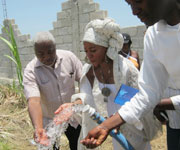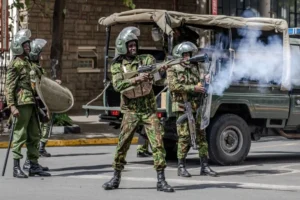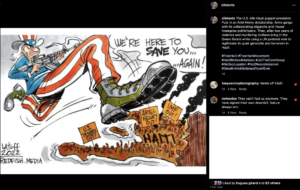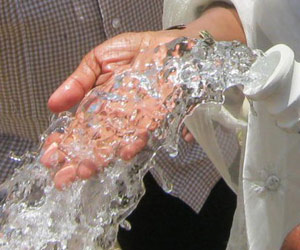Source: OpEdNews
February 16, 2011
Clean Water Is a Human Right but the UN contaminated Haiti’s water supply & NGO cholera treatment centers continue to unsafely dump medical and human waste
By Georgianne Nienaber
Translation and interpretive assistance in the field by Andre Paultre
On February 4, The United Nations Office for the Coordination of Humanitarian Affairs (OCHA) distributed its final “situation report” on issues covering Haiti’s cholera epidemic. With the end of the rainy season, new cases of cholera seem to be stabilizing, but the overall toll is staggering–220, 784 cases and 4,334 deaths–since the outbreak began in October 2010. A total of 400,000 cases are predicted within the first twelve months of the epidemic. We are now in month five.
Most disturbing, OCHA reports that several non-governmental “charity” organizations (NGOs) are about to reduce their activities relating to clean water and sanitation “because of a lack of funding or to focus on longer term strategies.” The problem is that, once introduced into an ecosystem, the cholera bacterium will not go away, even if the relief organizations do so.
Cholera can exist in association with aquatic plants, microscopic animals, bivalves, water birds, and in sediment. These are some of the environmental reservoirs for cholera, where it can live over time or where humans can come into contact with it. Colonies of cholera flourish with weather conditions that cause algae blooms; and this is why you see peaks and valleys in the cycles of human infections. Cholera in Haiti is approaching its nadir, but is expected to peak once the rainy season begins.
Also, consider that OCHA reported that Médecins Sans Frontières (MSF) and OXFAM will stop chlorination of 11 wells in the Port-au-Prince area that provide safe water for 374,500 people. The plan is to hand these activities over to DINEPA (the Haitian government’s water and sanitation authority). DINEPA is planning to distribute 7.2 million chlorination tablets and has already done so to 302,700 households. Consider that a household is at least five people, do the math, and the supply won’t last long.
OCHA says the pumping of excrement from latrines in cholera treatment centers (CTCs) “remains a major problem nationwide and the situation is worsening in some areas.” When companies such as the privately owned firm, JEDCO, and the NGO Red Cross transport the waste, it is hauled to the Truttier waste disposal site, near the slum of Cite Soleil (out of sight out of mind), and inexplicably located on the Plaine Cul-de-Sac Aquifer.
The Haitian grassroots organization Ayiti Kale Je reports that Homero Silva of the Pan American Health Organization said “cholera bacteria can go down to the aquifer or out to the sea where it could survive for many years, creating an ongoing problem for Haiti.”
Here is a short video we made after spending several hours at the Truttier dump.
The aquifer below this mess supplies water to the Port-au-Prince metropolitan area.
In addition, OCHA says, OXFAM will stop its water, sanitation, and hygiene (WASH) programs in temporary housing sites and is defining “a new strategy” for the next three years. What will happen in the interim? Despite the billions in aid pledged to Haiti, most of the estimated 800,000 to 1.5 million IDPs are living in substandard conditions and rely upon local water sources, such as the Plaine Cul-de-Sac Aquifer.
And what about the rural areas that experienced no quake damage, but depend upon the rivers for water? In rural areas people continue to drink non-potable (contaminated) water from rivers, streams and fountains. There are no municipal water purification systems. People cannot boil water due to lack of charcoal or firewood. Haiti is almost completely deforested in some areas. OCHA says “Access to schools in rural and mountainous areas to conduct cholera prevention activities remains an issue.”
Cholera has been reported in every department (similar to US counties) in Haiti, and OCHA reports MSF plans to stop its water chlorination, “as well as its water distribution activities in Port-de-Paix…no one is taking over that responsibility.”
We decided to go to Port de Paix to see for ourselves how much of a water “issue” people there faced. It took almost four hours from Gonaives to travel 86 kilometers (53 miles) through stunningly beautiful countryside in our Toyota 4 Runner. The locals use burros and horses and an occasional motorbike to negotiate a narrow, boulder-strewn road that snakes like a chalk line over, around, and through passes in mountainous terrain. Just when you think you can’t possible take the spine-compressing bouncing any longer, the road turns to pockmarked concrete as it enters Port-au-Paix. Haitian artists and poets reside in the city Columbus named “Valparaiso,” the valley of paradise. This port city is the capital of the of the Nord-Quest department and has a population of 250,000.

Nord-Quest by Georgianne Nienaber

Road from Gonaives to Port de Paix by Georgianne Nienaber
Our first stop was the MSF compound, and sadly we initially received the same treatment we have received at other locations in Haiti, as well as Congo. A guard manned the imposing red iron gate. Our translator asked if we might speak to an official. A young white man, who would not offer his name, came out to see us, but did not invite us inside to talk. In English, he explained he was the assistant director, could not talk to us, and if we came back the next day, he “might” be able to get us an interview with the director. We had a short, informal conversation about the problems MSF created by refusing to talk to reporters in the field as he smiled and said he “understood” this. He refused to comment on whether or not MSF was ending its water treatment program, as OCHA said in the report.
The gate closed and locked behind us, and as we were about to get into our car to find the Mayor of Port de Paix, another car pulled up to the gate. A woman who first identified herself as a “field coordinator” invited us inside the gate to sit down with her and answer any questions she could. In seven years, this was the first MSF staff member who ever willingly and graciously invited us inside an MSF compound.

MSF compound on left in foreground/ Photo credit: Georgianne Nienaber
Sabine Hardy was working for MSF in St. Louis du Nord, a small town 45 minutes to the east along the coast. This was her last day. She was about to have a celebratory lunch with other workers and was willing to put that on hold to speak with us. Hardy concurred that her group was leaving, but would have mechanisms in place to continue education through the local WASH cluster, the Ministere de la Sante Publique et de la Population (MSPP), and DINEPA. Beyond information about her specific field project, she referred us to MSF’s Caroline Seugin in Port-au-Prince, and gave us Seugin’s number.
The next stop was the mayor’s office. It happened that a man we stopped to ask directions of knew the mayor, M. Salvador Guillet. Guillet is the chief official of the commune of Port de Paix in the Nord-Quest Department. It was Sunday, and the mayor agreed to meet us in spite of the day and the hour, saying, “foreigners should be king,” with a wry smile.

M. Salvador Guillet, Mayor of Port de Paix / Photo credit: Georgianne Nienaber
The Mayor
Before we began asking questions about the sanitation situation in the commune, Guillet flipped through a thick notebook in which he recorded conversations, it seemed, pertaining to every meeting he attended. As he flipped through the pages, looking for the last meeting with MSF officials, he kept fingering a Blackberry with his left hand.
When asked whether he knew if MSF’s cholera mission was over, Guillet said he “asked the same question.” It was Sunday, February 6 and MSF was scheduled to leave the next day. “I met the lady in charge of MSP. She said there is decreased cholera and they will leave February 7 since there is less and less cholera,” Guillet said.
He has reason to be concerned. Although Guillet praised MSF for their “good work treating the sick,” he, like OCHA, wondered what would happen when they reduced services, especially water treatment.
Then the mayor flipped through his notebook and began to read the grim statistics of cholera infections and deaths in Nord-Quest. He began with figures from October 19 to November 23, 2010 (6,942 cases and 96 deaths). When we realized he was trying to provide us with an accurate count of total cases and deaths since the epidemic began, we stopped his accounting of the grim toll and told him the numbers were available on the MSPP website for Nord-Quest (13,387 cases, 208 deaths). He closed his ledger and looked almost relieved, smiling wanly. After all, as mayor, Guillet is the chief elective official; responsible by mandate and authority for the people of his commune. It crossed my mind to ask him is he felt responsible for a resolution of this crisis, but the look on his face was obvious and required no translation. He did.
NGOs tend to “come here and plant their flags and then leave,” Guillet said matter-of-factly, as if our question about water quality maintenance should answer itself.
According to the latest report by the Pan American Health Organization (PAHO), MSF-France will be leaving the Hopital Immaculee de Conception in Port de Paix where they take in about 10 cases of diarrhea a day – mostly non-cholera cases–compared to the 120 to 150 cases they were seeing previously. MSF-France is training the hospital’s staff in order to prepare for their full departure in mid- February.
A recent Haiti Health Cluster Bulletin discussed this issue.
The lack of partners in the North West is a particular concern. Clinical case management was largely carried out by MSF and the CMB… These NGOs continue to support the management of the treatment and rehydration centers (CTC, CTU and ORP). Yet following a reduction in the number of new cases, some partners are beginning to leave the department, including MSF.
Although DINEPA has an office in Port de Paix and has been distributing chlorination tablets (Aquatabs) and soap, Guillet did not know who would continue chlorination of the water supply. He fingered the Blackberry and tried calling Dr. Beauge Laurant, who is the General Director of Health. Laurant was unreachable, but we caught up with him.
Laurant echoed Guillet when we reached him by phone from Port-au-Prince two days later. “They (MSF-France) came with flags, but no assessment,” Laurant said. He termed NGO response to the cholera epidemic and lingering sanitation issues as an “intervention ponctuelle”–a timely intervention with no resolution. A major concern is that there is no water system in Port de Paix and the local government has no ability to chlorinate the water truck used to fill distribution bladders. Fountains come directly from the river source and there is no purification. Water purification tablets are the fallback, and there are not enough of them, or the local population does not have access to them.
Laurant suggested we call the DINEPA office in charge of Nord-Quest. Pierre Bernadin Poisson was our contact at the Technical Center Operations (CTE) /DINEPA office for Port de Paix. He was aware that MSF was leaving on February 28.
The plan was for CTE/DINEPA to take over water purification when MSF left, but “CTE does not have the capability to chlorinate water delivery,” Poisson said. The water source for Port de Paix is the Les Trois Rivieres (Three Rivers River). He noted that there are 41,750 boxes of 200 count Aquatab chlorination tablets in Nord-Quest Department. Each tablet purifies 5 liters of water. Nord-Quest also received 605,002 bars of soap.
Whether those tablets and soap are getting to the population is another matter.

Bathing and washing in Les Trois Rivieres
Three Rivers by Georgianne Nienaber
After we visited with Mayor Guillet on Sunday, we took a short drive to the city of La Pointe where locals told us they needed Aquatabs and bleach. It turned out that they had to buy tablets from the market and no one had enough money to purchase them. Why donated purification tablets are being sold openly in the “pharmacies” is another question and is beyond the scope of what we were prepared to investigate.

Public fountain in La Pointe | Photo: Georgianne Nienaber
In La Pointe, children were playing and drinking from public fountains that pumped water directly from the river. We asked a man who mixed bleach into the water used at the local hospital why no one was afraid of cholera. He said, erroneously, that cholera lived “in the dust” and that as long as it was not raining there was nothing to worry about, since water “activated the cholera.”
Nowhere could we find the brochures and educational materials about cholera MSPP says it and the NGOs are distributing to the countryside. What we found in La Pointe reflects OCHA’s comment that “There is currently a lack of communications material accompanying the distribution of chlorination products, suitable for people who can not read or write easily.”

MSPP Brochure- Image from educational brochure on internet
MSPP Brochure by Georgianne Nienaber
We finally spoke with MSF’s Emergency Medical Coordinator, Caroline Seguin, by phone. She confirmed that MSF was leaving Port de Paix, but would continue to “monitor” the cholera situation every two weeks. Some cholera treatment centers would remain staffed, but the NGO would longer treat the water. MSF issued a well-publicized appeal for funding in November, calling upon all NGOs to “step up” their cholera response.
Is now really the time to “step down?”
So what is the solution to this oversight–this “intervention ponctuelle?”
NGOs should stop funding themselves and direct efforts and money to local governments. The latest USAID “fact sheet” says to date $43,476,746 has been earmarked for cholera response, not including the $13.2 million MSF has spent from its own funds.
The mayor of Port de Paix certainly understands the needs of his electorate better than an international NGO. For now, the ability to chlorinate the water truck would be a godsend.
The right to clean water and sanitation is a human right–ironically a right recognized by the United Nations, whose troops inadvertently introduced cholera to Haiti in November.
178 countries have now recognized the right to water and sanitation at least once in an international resolution or declaration. This includes the improvement of all aspects of environmental and industrial hygiene; and the prevention, treatment and control of epidemic, endemic, and other diseases.
Perhaps this should be the first standard imposed upon any organization authorized to accept money on behalf of the Haitian people–grant them their basic human right to clean water.
Next: What in the world happened in the village of Fond Baptiste when residents developed blindness, paralysis, and died?
***************
Author’s Bio:
Georgianne Nienaber is an investigative environmental and political writer. She lives in rural northern Minnesota, New Orleans and South Florida. Her articles have appeared in The Society of Professional Journalists’ Online Quill Magazine, The Ugandan Independent, Rwanda’s New Times, India’s TerraGreen, COA News, ZNET, OpEdNews, Glide Magazine, The Journal of the International Primate Protection League, Africa Front, The United Nations Publication, A Civil Society Observer, Bitch Magazine, and Zimbabwe’s The Daily Mirror. Her fiction expos- of insurance fraud in the horse industry, Horse Sense, was re-released in early 2006. Gorilla Dreams: The Legacy of Dian Fossey was also released in 2006. Nienaber spent much of 2007 doing research in South Africa, Rwanda and the Democratic Republic of Congo. She was in DRC as a MONUC-accredited journalist, and has been living Southern Louisiana investigating hurricane reconstruction and getting to know the people there since late 2007. Nienaber is currently developing a documentary on the Gulf of Mexico Dead Zone, and continuing “to explore the magic of the Deep South.” She is a member of the Memphis Chapter of the National Academy of Recording Arts and Sciences.
Add a comment:
Powered by Facebook Comments









Nicely done article. I would like to know if partners In Health is doing any better than this. At least they are a permanent presence and PIH’s policy is to work with and empower governmental institutions. Something needs to be started to begin creating community wealth within local organizations and subdivisions, such as cooperative enterprises. Local communities know best what resources are lacking and what community assets, especially people are available to improve infrastructure and support structures.
Ezili,
I had watched the video earlier and was saddened to see the people playing in, washing in and drinking the water. To see the waste being dumped into the waterways is also very, very sad.
Reading this article sparks my thought process to recognize that colonization has become an insufficient attempt against the Haitian People. They (NGO’s, USAID, USA, RED CROSS, etc) now want total annihilation of the Haitian People. What else could this be other than the perpetuation of “slow death.”
Refer back to the American Indian and what happened to them as a race of people over time after their take over by the Amerikkan white man (boy).
It seems that there are forces that truly see the monetary value of the oil that has been discovered in and around Haitian waterways and everything else is but an attempt to clear the way for those resources to be stolen from the people. The less people, the less struggle, the less the thieves will have to deal with in their theft.
Oh how sad. I ask myself daily, who, what, where will the assistance come from to stave off all that has happened and what is yet to happen.
The only hope as I have stated before will be a possible armed struggle by the Haitian people yet I realize that the people have not enough arms to fight a battle as immense as this will become. The will of the people, for them to truly understand what is happening to them and their future must change. No longer can it be allowed for them to reflect backwards as to what has taken place and to not believe that they can win.
Once the will of the people changes and they can act as one unit with one goal in mind, that goal being armed insurrection, there will be no hope.
Ezili, I abhor violence believe me I do however I see no other way for Haiti’s survival.
Prayer is important but prayer without works leads to doom and damnation.
Keep doing what you are doing as you are a powerful force. Continue to educate and although you are an attorney who must stay grounded within the realm of law, maintain your open mind.
Be Well, stay blessed and may you always be protected from the harm and the evil people that exist on this earth.
Eric Watkins
Eric,
Thanks for the support. The most powerful nation, using its full might to slowly kill, constantly shock, starve and poison the weakest most cruelly abused human beings in this Hemisphere is a horrible sight for the human mind to behold, absorb. But be not discouraged. They cannot exterminated all Haitians with a legacy to reach for. Not possible. It’s hard with a human mind to not see the calamity and pestilence released upon defenseless Haitians as this Neinaber post details. Remember, though, Haiti’s mission from its inception. There was a time, back before August 14, 1791, when no one thought it possible to beat this sort Euro/US organized world tyranny they called “civilization” but our foreparents, the amalgamated Africans who became Haitians in the land of the Tainos, also so degraded, wounded and humiliated, did. It shall happen again and last this time. That’s our legacy to reach for. Thanks for standing with us. This âdemocracy,â âenlightenment,â – the zenith in Euro/US human, scientific, political, social and structural developmentâ â this narcissism of the white power structure and its profit-over-people Oligarchs is unsustainable and death. The tools of combat will crawl out from regular people not unhinged from the womb, count on it, not on the graven images demoralizing the poor majority in Haiti and decent people worldwide.
This is the awareness we at Ezili’s HLLN hold on to, every nanosecond.
Ginen poze,
Ezili Dantò
Hello Ms. Ezili Danto,
What I’d like to ask you is how we, the Haitian Diaspora, can become involved in helping our blood in Haiti. When I say help, I mean starting out with simple things first, like funding media advertisements on the Haitian radio so that they can educate and broadcast to the masses that they should boil their water instead of accept the poison given out by “international help.” This could easily –and should have been used from the start to– save lives of those suffering from the imported epidemic. I’ve just donated money to Erzili Danto’s website but I want to know how we can become proactive in influencing Ayiti’s future, and how the money we donate is being used. Also what powerful forces can we contact to help us make proactive change for Ayiti and the people of Ayiti. Now I did not forget about the folks residing in the country because I know that things are more difficult for them, not possessing the resources to boil water. But like Dady Chery put it “As formidable as cholera may appear, it is [still] easily disarmed.”